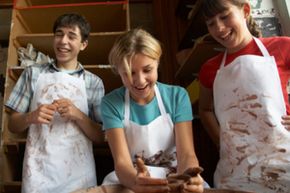Learning disabilities are no obstacle to a successful future -- even Albert Einstein was a late bloomer when it came to reading. Conditions like dyslexia, dysgraphia and dyscalculia can make school tough, though. Assignments that are simple for some kids can take much longer and require one-on-one special attention for a child with a learning disability. We've got a few activities that should make reading, writing and solving math problems a little more fun.
- Take it up a notch: With some learning disabilities, reading and writing are extremely difficult to master. But if you can bring in the child's other senses instead of just staring at a book or a blank piece of paper, you're on the right track. Get imaginative -- practice writing in the air with big, dramatic gestures or make letters with Play-Doh that smells good. Have the child draw what you're reading about -- there's a reason picture books are so popular! Whenever you can, remember not to focus just on the visuals. Bring in scent, taste, movement and auditory elements. When the child reads, he or she can also say what's being read, draw the story and even act it out. The same thing goes for math problems -- using concrete objects, acting out a word problem and drawing what the equation is talking about can really help.
- Make writing fun: Having a learning disability that affects language might make writing seem like a chore. Why not make it fun again? The Learning Disabilities Association of America suggests making a bunch of postcards with the child and decorating them. Then he or she can write a few sentences to friends or relatives and send them off (with the added bonus that kids love getting mail back). Reading of any type is good, so you could also break out a cookbook and make kooky kid recipes and then have a child write a sentence or two about how it turned out -- flipping open that book a year later and seeing a comment that the macaroni was just the right shade of orange should make you smile.
- Go in another direction: It's not uncommon for a child with learning disabilities to feel like he or she isn't as smart as his or her classmates. It's important to make clear that learning disabilities have nothing to do with intelligence, but it will also be a self-esteem boost to find the kid another activity to excel in that's also a respite from the stuff that's hard. Sports promote teamwork and cooperation, while the arts allow for creative expression. You may have the world's best archer, sculptor or fisherman on your hands and not even know it because you spend so much of the school year with tutors!
Advertisement
